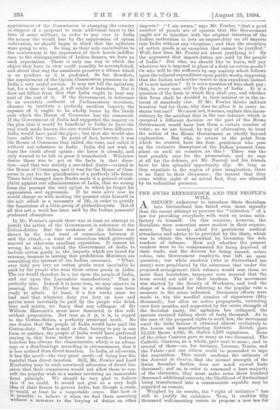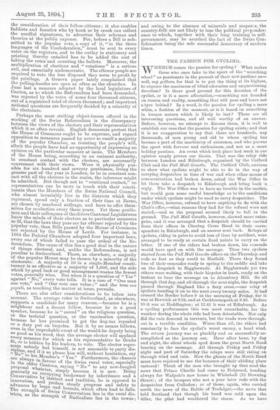THE SWISS REFERENDUM AND THE PEOPLE'S WILL.
ASECOND endeavour to introduce State Socialism into Switzerland has failed even more signally than the recent attempt to procure the " initiation " of a law for providing everybody with work on terms satis- factory to himself. On this occasion, however, the Socialists were somewhat more modest in their require- ments. They merely asked for gratuitous medical attendance and advice to be provided by the State, which was to obtain the wherewithal by becoming the sole vendors of tobacco. How and whether the present vendors were to be compensated for being deprived of their trade, and the doctors for being turned, nolens volens, into Government employes, was left an open question ; but while smokers (who in Switzerland are many) were propitiated by the assurance that under the proposed arrangement their tobacco would cost them no more than heretofore, taxpayers were assured that the boon would not add to their burdens. The movement was started by the Society of Workmen, and took the shape of a demand for referring to the popular vote a measure in the sense indicated. Strenuous efforts were made to win the needful number of signatures (fifty thousand); but after an active propaganda, extending over four months, and supported by the entire strength of the Socialist party, the agitation has collapsed, the assents received falling short of forty thousand. As in the case of the proposed right-to-work law, the movement owed the little favour it obtained almost exclusively to the towns and manufacturing districts. Zilrich gave 13,358, Berne 4,920, St. Gallen 4,298 signatures. None of the other Cantons gave so many as two thousand. The Catholic Cantons, as a whole, gave next to none ; and in several of them—as, for instance, Lucerne, Tessin, and the Valais—not one citizen could be persuaded to sign the requisition. This result confirms the estimate of the Journal de Genhe, that the normal strength of the Swiss Socialist faction does not much exceed forty thousand ; and as, in order to command a bare majority of the electorate, they must make some three hundred thousand additional converts, the likelihood of Switzerland being transformed into a communistic republic may be regarded as remote. Weighed by its results, the " right of initiation" has still to justify its existence. True, it enables fifty thousand well-meaning voters to propose a new law for the consideration of their fellow-citizens ; it also enables faddists and fanatics who by hook or by crook can collect the needful signatures, to advertise their schemes and theories at the public expense. For, before a Bill is sub- mitted to the popular vote, a copy of it, " in the three languages of the Confederation," must be sent to every voter on the registers, and to the outlay in stationery and printing thereby entailed has to be added the cost of taking the votes and counting the ballots. Moreover, the multiplication of elections and " votations " is a serious evil, and essentially undemocratic. The oftener people are required to vote the less disposed they seem to profit by the privilege. A Geneva paper lately complained that the polling-booths are open as often as the churches. In June last a measure adopted by the local legislature of Canton, as to which the Referendum had been demanded, was rejected by the votes of some four thousand citizens, out of a registered total of eleven thousand ; and important national questions are frequently decided by a minority of the electorate.
Perhaps the most striking object-lesson offered in the working of the Swiss Referendum is the discrepancy between the views of the electors and their representatives which it so often reveals. English democrats protest that the House of Commons ought to be supreme, and regard opposition to measures passed by never so small a majority of the popular Chamber, as resisting the people's will, albeit the people have had no opportunity of expressing an opinion on the particular measure at issue. The Members of the House being, according to an eminent authority, in constant contact with the electors, are necessarily conversant with their views. Were it physically pos- sible for six hundred and seventy gentlemen, living the greater part of the year in London, to be in constant con- tact with all the electors in the realm, the inference might be admitted. But though not in " continual contact," no representatives can be more in touch with their consti- tuents than the Members of the Swiss National Council, who almost invariably live in the districts which they represent, spend only a fraction of their time at Berne, are chosen by manhood suffrage, and have to offer them- selves for re-election every these years. Yet these gentle- men and their colleagues of the divers Cantonal Legislatures know the minds of their electors as to particular measures so ill, that the laws they pass are far oftener rejected by the popular vote, than Bills passed by the House of Commons are rejected by the House of Lords. For instance, in 1884 the Federal Chambers adopted four important laws, every one of which failed to pass the ordeal of the Re- ferendum. The cause of this lies a good deal in the nature of things electoral, and, unlike the Referendum, is not peculiar to Switzerland. There, as elsewhere, a majority of the popular House may be chosen by a minority of the electorate. A majority of 10 in a single-Member consti- tuency is as effective as a majority of 1,000, and the side which by good luck or good management wastes the fewest votes, generally wins. But when it is a question of " Yes " against " No," every vote tells. It is a case of " One man one vote," and " One vote one value ; " and the true vox populi, as touching the matter at issue, prevails.
There are also other considerations to be taken into account. The average voter in Switzerland, as elsewhere, supports a candidate for many reasons,—because he is a neighbour and a decent fellow, because he is a good speaker, because he is " sound" on the religious question, or the teetotal question, or the vaccination question, because he has promised to get the dog-tax repealed or a duty put on bicycles. But it by no means follows, even in the improbable event of the would-be deputy being as good as his word, that the average elector will applaud. every measure for which as his representative he thinks fit, or is bidden by his leaders, to vote. The elector repre- sents nobody but himself, is not amenable to party dis- e,toto, and if it so please him will, without hesitation, say to his Member's " Yes* " Furthermore, the chances are always in favour of the Swiss rural voter, especially in the older Cantons, saying No ,, to any new-fangled proposal whateversimply because it is new. Being generally an occupying landowner by inheritance and a Conservative byinstinct and tradition, he is opposed to prfn innovation, and ed bounds, steady progress and safety to advances by leaps and ounds, which often lead to falls. The strength of Swiss Conservatism lies in the rural dis- tricts, as the strength of Radicalism lies in the towns ; and owing to the absence of minerals and seaports, the country-folk are not likely to lose the political preponder- ance to which, together with their long training in self- government, may be ascribed the fact of the Swiss Con- federation being the sole successful democracy of modern times.

































 Previous page
Previous page